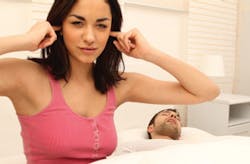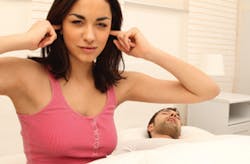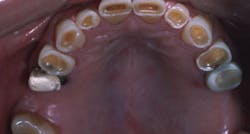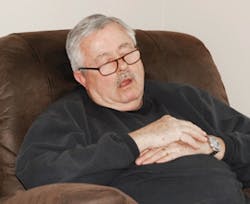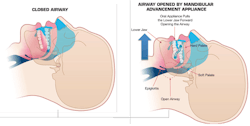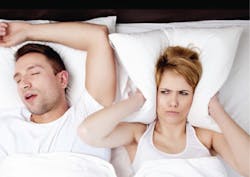Sleep and dentistry
by Gordon J. Christensen, DDS, MSD, PhD
There appears to be significantly more interest in sleep medicine than I've ever seen before. I see ads in newspapers and magazines and hear about this subject routinely on radio and TV. Some of the solicitations are from sleep clinics, and others are from physicians and dentists. I'm confused. What's the most legitimate source of treatment for sleep problems? Should dentists become involved in sleep medicine? If so, which sleep medicine techniques should dentists incorporate into their practices?
You are certainly correct! Sleep medicine has had major visibility lately. The additional activity can be attributed to many sources, one of which is probably the desire of health practitioners to help the high number of patients with these problems. Another is because it is a significant source of not only patient service, but potential practice revenue.
I will include in my answer to you an overview of the subject, and also my own views on how important sleep medicine can be for dentists.
One of the major reasons I like this topic is because it is a significant area of health care in which physicians need dentists and dentists need physicians in order to effectively treat patients. A physician can no more provide oral appliance therapy to a patient than a dentist should diagnose sleep apnea. A prerequisite to successful oral appliance therapy is cooperation between dentists and physicians.
Why is this true?
In a position paper, the American Academy of Sleep Medicine created guidelines about which some practitioners have little knowledge. This position paper is very important to dentists who want to become involved with sleep medicine. What follows in the next few paragraphs is a critical part of the paper as it relates to dentists getting into this area.
When a dentist or dental specialist becomes educated in sleep medicine and announces that their practice includes sleep medicine, many patients are interested. It is a well-known fact that 40% to 50% of people snore. This is an obnoxious condition that is offensive to anyone sleeping near the snorer, and it is known to cause many psychological and physiological problems, including marital problems. (Fig. 1) Can dentists assist in reducing or eliminating snoring? The answer is a resounding YES! Dentists are essential for this task!
BUT, can there be negative clinical side effects when snoring is stopped or reduced with use of an oral appliance? YES, a very serious and potentially life threatening condition, sleep apnea, can be increased when an occlusal snore appliance is placed without patient or practitioner knowledge of the presence of sleep apnea. Unfortunately, the described procedure is a common occurrence for some dental practitioners who place oral appliances before a sleep study has been accomplished.
This scenario exemplifies the necessary and desirable interaction of dentists and physicians. Before an oral appliance is used, a board-certified sleep physician, usually associated with a sleep clinic, should evaluate the snorer to determine if the person has other interrelated breathing problems.
A sleep study can be accomplished in a sleep clinic, with the results analyzed by the sleep physician, or by having the patient use a home sleep-testing device, and having the data analyzed by a board-certified sleep physician associated with the specific company or an individual practitioner.
Here are some home sleep-testing devices. You can find additional pertinent information by investigating these companies online.
- ARES from Watermark Medical
- Bruxism Sleep Monitor from DDME
- Embletta X100 from Sleep Group Solutions
- WatchPAT from Itamar Medical
What information will be found in the sleep study? (Fig. 2)
- The frequency and intensity of snoring
- The presence, frequency, and length of pauses in breathing or sleep apnea (Fig. 3)
- The type of sleep apnea
-- Obstructive (airway blocked)
-- Central (central nervous system does not stimulate breathing on a constant basis)
-- Complex (a combination of obstructive and central)
- The frequency and intensity of bruxism (available from DDME Inc. mentioned above) (Fig. 4)
Oral appliances are usually fabricated by dental lab technicians and seated and supervised clinically by dentists. They are used for some levels of obstructive sleep apnea, but CPAP devices are the "gold standard" for severe apnea. Placing an oral appliance in patients with central or complex sleep apnea may worsen the problem or delay effective treatment, and therefore should be treated by other techniques and supervised by a sleep physician.
A sleep test should be accomplished and analyzed before placing an oral appliance for snoring. When a test has occurred, snoring has been identified as the major problem, and it has been determined that central or complex sleep apnea are not present, an oral appliance may be indicated.
What do oral appliances accomplish? Each type of appliance does something different, but each opens the airway.
- The most commonly used oral appliances move the mandible forward up to 70% of the distance from centric relation to total anterior protrusive. (Fig. 5) As the mandible is moved forward, the tongue also moves forward, usually opening the airway sufficiently to reduce or eliminate the snoring.
- The oral appliances pull the tongue forward, not influencing the mandible significantly, but clearing the airway.
- The oral appliances depress the tongue with a resin extension on an occlusal splintlike mandibular appliance, thereby opening the airway. This appliance does not influence the mandible significantly.
There are many types of oral appliances, and numerous studies have been conducted on them. The research shows that all of the oral appliance concepts accomplish their intended purposes relatively well. Research also shows that other factors, such as size of tongue, remaining teeth, size of the appliance, and ability for the patient to tolerate the appliance are more important than the type of appliance. I suggest that you find a dental laboratory that will make oral sleep appliances for you, and talk to an expert in the lab to determine which appliance they recommend for you. Some laboratories that are well known for their expertise in making these appliances are:
- Glidewell Dental Labs
- Great Lakes Orthodontics
- Keller Laboratories
Are there other antisnoring devices and concepts? Yes, there are many, and all of them work with varying levels of success. Some of the antisnoring treatments and suggestions follow:
- Oral appliances
- Surgery
- Continuous positive airway pressure (CPAP)
- Pillar procedure
- Over-the-counter nasal sprays
- Nasal strips, clips, and cones
- Antisnore pillows and clothing
- Weight loss
- Smoking cessation
- Sleeping on one's side, not on the back
- Avoiding alcohol
- Avoiding medications that relax throat muscles
Many of the products mentioned above are available to patients in local stores without any observation by a health practitioner. Again, it is obvious that a sleep test would be desirable before using any antisnoring treatments. Snoring is only part of the problem. The much more dangerous sleep apnea must also be considered.
We recently made a one-hour video on sleep medicine that will help you incorporate this concept into your practice. The people providing information on the video include Dr. Mike DiTolla, a very knowledgeable dentist who has significant experience with oral appliances, Jeff Wyscarver, an experienced sleep technician, and myself. This team will get you up to speed on getting into dental sleep medicine, including how to receive third-party payment for the procedures.
Summary
To concisely summarize my answer, YES, dentists are very important practitioners in the area of sleep medicine, but they should team with board-certified sleep physicians to adequately treat patients with these very commonly occurring maladies. (Fig. 6).
Gordon Christensen, DDS, MSD, PhD, is a practicing prosthodontist in Provo, Utah. He is the founder and director of Practical Clinical Courses, an international continuing-education organization initiated in 1981 for dental professionals. Dr. Christensen is a cofounder (with his wife, Dr. Rella Christensen) and CEO of CLINICIANS REPORT (formerly Clinical Research Associates).
In this monthly feature, Dr. Gordon Christensen addresses the most frequently asked questions from Dental Economics® readers. If you would like to submit a question to Dr. Christensen, please send an email to [email protected].
For more information about
Snoring and Sleep Apnea Prevention and Treatment
(Item# V3963),
visit our website www.pccdental.com or call 800-223-6569.
Past DE Issues
